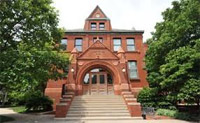Architecture, College of

Masters in Architecture Program: Theses
First Advisor
Jeffrey L. Day
Date of this Version
5-2019
Document Type
Thesis
Abstract
The study of phenomenology within architecture is rooted in the emphasis of the experience of the human body. The ability to understand how a human inhabits a space is crucial; through the study of the human experience, we are able to study phenomenology within architecture. But what happens when the human body doesn’t react the way that we, as architects, desire? Since the reliance on vision is the most prominent sense for a phenomenological experience of a space, taking away that sense seems to lessen the impact. As a result, this privileging of vision leads to missed opportunities within design. Thus, by using the process of visual diffusion, the emphasis of an architectural journey is no longer prominently put onto the visual sense, rather the other senses are able to be enhanced.


Comments
A design thesis Presented to the Faculty of The College of Architecture at the University of Nebraska In Partial Fulfillment of Requirements For the Degree of Master of Architecture, Major: Architecture, Under the Supervision of Professor Jeffrey L. Day. Lincoln, Nebraska: May 2019
Copyright 2019 Diane Nguyen